|
What’s the first word that pops into your head when you hear the words “a David Mamet film”? Chances are it’s not “charming,” but this assumes you’ve never seen his second feature as director, Things Change, which frankly is as charming as all hell. It certainly caught me by surprise when I first saw it many years ago. I was a big fan of Mamet’s debut feature as director, House of Games, as well as his screenplay for The Untouchables, and although not a regular theatregoer, I was genuinely blown away by the London stage production of Glengarry Glen Ross, which as we all know was later adapted into a belter of a movie. The thing is, none of these works could be exactly considered fun, and if you’re coming to Things Change retrospectively you can add the likes of Oleana, American Buffalo and Edmondinto the mix. Yet for his second film as director, which again stars House of Games leading man Joe Mantegna, Mamet was apparently persuaded by co-screenwriter Shel Silverstein to take a decidedly lighter touch.
Here Mantegna plays Jerry, a low-level soldier for a Chicago mafia family who is currently on probation after failing to follow orders and is looking for a way to possibly redeem himself. Gino (Don Ameche) is an ageing Sicilian shoe shiner who bears a striking resemblance to a key mafia figure who is facing jail time for murder. As the film opens, Gino is visited by mob enforcers Frankie (J.J. Johnston) and Mr. Silver (Ricky Jay) and brought before Chicago mafia kingpin, Mr. Green (Mike Nussbaum). Green makes Gino an offer – if he will take the rap for the murder and serve three to five years in jail, the family will reward him, allowing him to return to Sicily and buy the fishing boat that he has always dreamed of owning. At first, the humble Gino politely declines, but when he is reminded of the inconsequential nature of his life as it is now, he has a change of heart and agrees to take the accused mobster’s place. Jerry is then gets the chance to win back some favour with his bosses when he is given the job of minding Gino for few days in a hotel room helping him learn his story and get into character. When the training goes smoothly, the now bored Jerry asks Gino if there is something he would like to do before heading to jail. Gino responds that he’d like to take a walk on the beach, a wish Jerry grants by taking him to Lake Tahoe for a couple of days of relaxation and fun, the aim being to return to the hotel in time for Gino’s fateful court appearance. What could possibly go wrong?
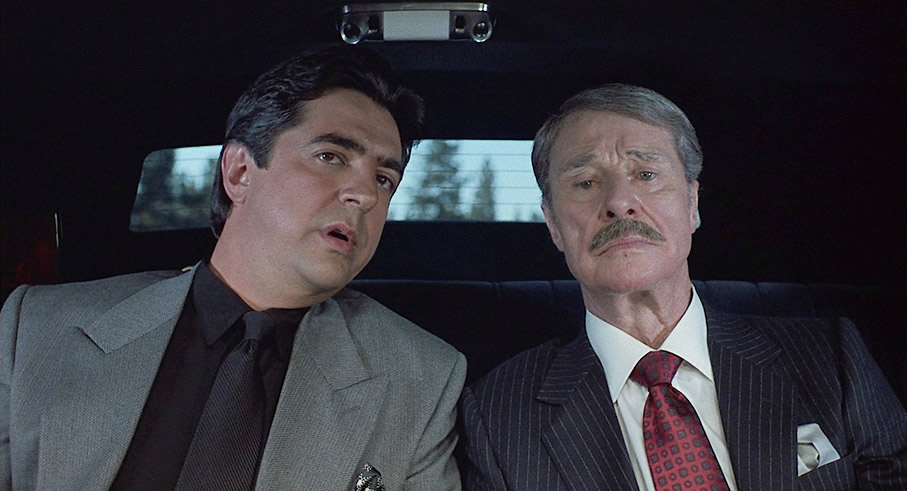
Although there can be few who do not have a good idea where this is heading, there are still a fair few surprises on the way. The first comes when Jerry is recognised at the airport by Billy Drake (William H. Macy), a driver for the powerful Lake Tahoe mob who has just dropped off his latest charge and who insists on driving Jerry and Gino to their hotel. On the way there he misinterprets Jerry’s reluctance to reveal who Gino really is to mean that he’s likely a mafia big shot who is travelling incognito, something Jerry cottons on to and plays along with. It turns out that Billy has connections at the hotel and quietly gives them the nod about what he believes is Gino’s status, and as a result Gino and Jerry are given the best suite in the house and invited to avail themselves of all services free of charge, including gambling at the hotel casino. All seems to be going well, despite a near disaster on the casino floor, when two large and imposing men show up and inform Gino that the powerful and influential local mob boss Don Giuseppe (Robert Prosky) has requested the company of this mysterious but apparently important underworld figure.
That things will complicate for Jerry is inevitable from the moment he and Gino step off the plane, as frankly if the weekend passed without incident then Mamet wouldn’t have much of a story to tell (although in the right hands – perhaps even Mamet’s – I’m sure this could still form the basis of an interesting study of two initially very different people). Of course, the increasingly problematic situation in which Jerry finds himself in is very much one of his own making, his overconfidence born initially of his frustration at being put on probation and fuelled by the taste of power he is handed when Gino is mistaken for a visiting Don. In the space of just a few days he goes from washing his fellow gangster’s dishes to having the staff at a swanky hotel respond eagerly to his every whim, but once Don Giuseppe takes an interest in Gino, Jerry quickly finds himself way out of his depth.
What happens to the two men at Lake Tahoe has all the elements of farce but is crucially never farcical, unfolding instead as a series of gently paced but potentially disastrous “uh-oh” moments that grow organically from the situation in which the two men have found themselves. Thus, the fact that Don Giuseppe would want to meet this mysterious visitor feels completely logical given that Giuseppe’s position as the Don of Dons and his belief that Gino is a man of high status within their organisation. Of course, should the truth be revealed, the consequences for Gino and Jerry would be catastrophic, but as a more light-hearted take on the setup for Hal Ashby’s The Last Detail moves into Being There territory and Giuseppe reads deeper meaning into Gino’s words and warms to his presence, all Jerry can do is hover nervously on the periphery, once again reduced to a menial role. “I put him on probation,” Gino even quips to Giuseppe at one point, seemingly bringing the unfortunate Jerry’s journey full circle. When this situation complicates further it does so in a manner that allows Mamet and his actors to walk a tightrope between near-farcical comedy and nail-chewing tension, as a situation arises from which both men must quietly take their leave and whose consequences for failure are deadly serious. And for all its charm, this is still a David Mamet film and we thus know deep down there are thus no guarantees of a happy ending.
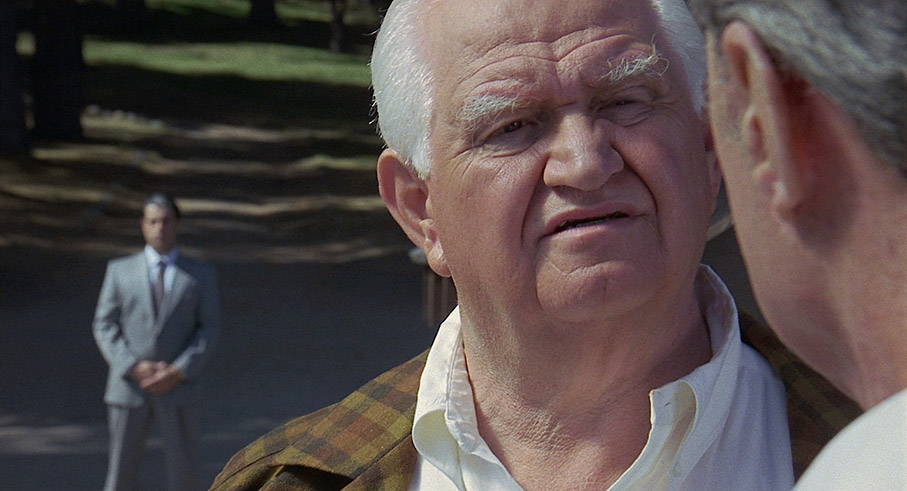
A late story twist that takes the drama into potentially darker territory may be one I could see coming, and the manner in which the story is wrapped up may feel just a little too tidy, but it matters not. The groundwork for it is laid early in the shape of a coin that is at one point exchanged for another and ultimately brings this strand of the story back to its origin. I also by this point was just too invested in these characters to be satisfied with anything other than what Mamet and his co-screenwriter Shel Silverstein ultimately chose to deliver.
The performances are sublime. I’ve been a fan of Joe Mantegna since I first saw House of Games, and as Jerry he is able to show a warmer side of his screen persona playing a man who believes he could be more than he is within his organisation, but who in truth probably couldn’t. He also gets to explore a previously untapped (on film at least) gift of deadpan comedy, which is at its best in his ‘you’ve got to be kidding me’ responses to unpredicted and potentially disastrous turns of fate. As Gino, Don Ameche is delightful casting, his big moustache and hangdog features contributing to his early presentation as a humble man who has achieved little and has no prospects. When he initially turns down Mr. Green’s offer and Green responds by ordering him curtly to shine his shoes, Ameche’s expression tells you all you need to know about his inner disappointment at how his life has turned out. Later, however, when conversing with Don Giuseppe, it’s easy to see him as an ageing Don who appreciates the simple things in life and whose every word could be seen to have metaphorical meaning. The supporting players are every bit as good, with Robert Prosky perfect casting as Don Guiseppe, a role that was originally earmarked for Ameche. There was an almost chameleonic quality to Prosky as an actor, able as he is to come across as the world’s friendliest uncle one minute and a seriously dangerous threat to life and limb the next. Here, both qualities are played off each other, making his friendliness towards Gino feel completely genuine but also suggesting that if he finds out who he really is, he would not flinch from unleashing a horrible punishment on both men. At one point, when he insists that Gino stay for dinner and Jerry interrupts to politely insist that they have to leave, all Prosky has to do is turn to look at Jerry to silence him mid-sentence. A spikily blonde-haired William H. Macy is amusingly eager as mob driver Billy Drake, and also making their mark are fellow House of Games alumni J.J. Johnson, Ricky Jay and Mike Nussbaum as mobsters Frankie, Mr. Silver and Mr. Green respectively. Even the small roles have been cast with care – there’s no question that Jerry and Gino would comply with the request to attend a meeting with Don Giuseppe when it’s delivered by well-dressed but imposing enforcers Kenny and Harry (Vincent Guastaferro and Christopher Kaldor).
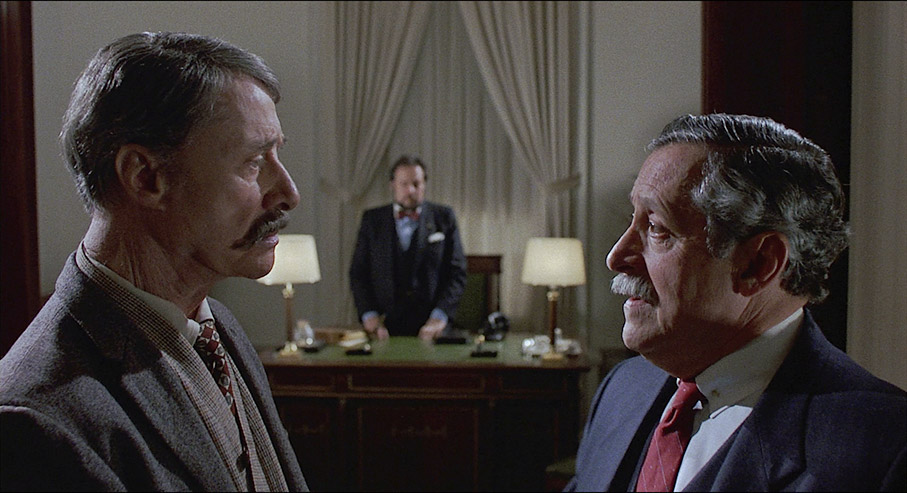
I first saw Things Change on video late in 1989, having failed to catch it on a UK cinema release the previous year that completely bypassed my neck of the woods, and recall being both surprised and enchanted by it. For reasons I cannot quite fathom, I have since re-watched Mamet’s House of Games and Homicide several times and yet have never revisited the film that he made between them. When Indicator announced that it was releasing the film on Blu-ray, I responded with mixture of gleeful anticipation and mild apprehension. Was my failure to revisit it due to an unconscious suspicion that despite its pleasures, it lacked the gravitas of what I had since come to expect from a film bearing Mamet’s name? Over two decades later, would I smile politely, offer the odd nod of appreciation but be ultimately a little disappointed? Not in the least. Things Change still delights and is all the more enchanting for being so atypical of its writer-director whilst still absolutely bearing his mark, from his precise direction and smartly-written dialogue to the smooth flow of the storytelling and the excellent performances he elicits from his perfectly chosen cast. A hugely entertaining but too-little seen work from a major talent, Things Change is David Mamet at his most upbeat and life-affirming, and on that score alone is a work to treasure.
A genuinely lovely 1080p transfer from a top-notch Sony HD remaster in the film’s original aspect ratio of 1.85:1. Detail is pin-sharp with no evidence of digital enhancement, while the balance of the contrast range is close to perfect in sunlit daylight exteriors and generous on shadow detail on interiors whilst still boasting rock-solid black levels. Colour is pleasingly naturalistic and vibrant when appropriate, notably in the décor of the casino and the luminous blue of the Lake Tahoe skies. A very fine film grain is visible and there is no trace of dust or dirt. Excellent.
The remastered Linear PCM soundtrack caught me out a little, not because there’s anything even remotely wrong with it, but because it is single-channel mono – somehow, I expected a film from 1988, even a modestly budgeted one, to be in stereo, but I have absolutely no reason to question the authenticity of this mix. Either way, it sounds great, with very clear reproduction of dialogue, effects and music and a wide dynamic range for a mono track. I’ve no complaints here.
Optional English subtitles for the deaf and hearing impaired have been included.
David Mamet: Engineering Things (20:35)
A welcome interview with Things Change director and co-writer David Mamet, who for reasons best known to himself elected to be filmed whilst lounging in a chair with his feet up on a desk in a pose that does at least make full use of the 16:9 frame. He looks back at his early interest in becoming an actor and how this led him on to writing and working with Joe Mantegna in Chicago’s Organic Theatre Company. We learn about how Things Change came about and the process of eventually casting Don Ameche as Gino after first pursuing Italian actors Marcello Mastroianni and Nino Manfredi for the role. He also comments on the actors whom he also worked with in House of Games and the casting of a satirical short film he made for Funny or Die titled Lost Masterpieces of Pornography, which stars Kristen Bell, Ed O'Neill and Ricky Jay. You can find it here. He also reveals that he loves making movies but can’t stand re-watching them later, and he has some interesting comments about the pointlessness of taking selfies. With you on that one.
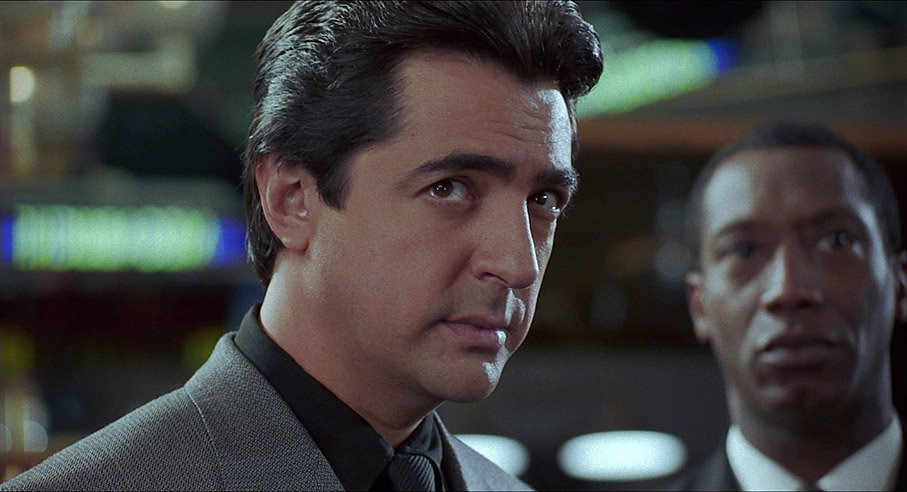
Joe Mantegna: Things Happen (29:21)
A most engaging interview with the film’s co-lead, Joe Mantegna, who recalls falling in love with acting at an early age and traces his journey from high school plays to drama school, stage musicals and Chicago’s Organic Theatre Company. He remembers his first meeting with the then unknown Mamet and talks about the friendship and working relationship that subsequently developed between them over the course of several plays and movies. There’s plenty on Things Change, including a rather lovely story about the casting of Don Ameche, plus comments on the other Mamet regulars in the film and the revelation that the wrap party fell on his 40th birthday and that the Mayor of Chicago designated it ‘Joe Mantegna Day’. It’s clear he really enjoyed making the film, and there are a couple of other engaging Don Ameche stories, including one about their joint Best Actor prize win at the Venice Film Festival.
Alaric Rokko Jans: Melodies for Mamet (17:07)
Composer Alaric Rokko Jans, in what may be – a little surprisingly – the first self-filmed lockdown interview I’ve seen as a Blu-ray extra, tells the story of how he first developed an interest in music and composition, how he first met David Mamet and how, after a stint as part of an “almost famous” folk rock band, he was first invited by him to compose the music for a stage production in which he was involved. This eventually led to him scoring some of Mamet’s own plays and four of his films, where his scores each proved very different in tone and content. He gets into specifics about the Thing Change music, which for a non-musical oik like me is always interesting territory, and he outlines his intention to reflect the melancholia and goodness of the film but leave the comedy to the actors. That he had just six weeks to write, arrange and record the score makes the result seem even more impressive.
Bob Deering: Life as It Could Be (9:48)
As he was with his comments on Indicator’s Crimewave Blu-ray (which were clearly filmed at the same time), comedian, musician and writer Rob Deering seems to almost uncannily in sync with my own view of the film, and here is brimming with infectious enthusiasm for what he describes without embarrassment as a hidden gem. He examines what’s so good about Don Ameche’s performance, how Ameche and Mantegna make for a lovely double act, the work of Robert Prosky, and he even picks up on the connections I’d noted to Being There and The Last Detail, damn him.
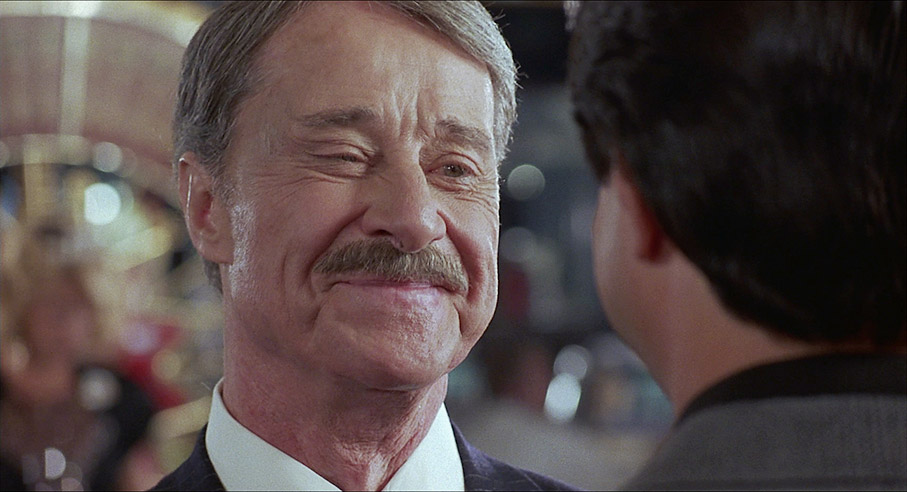
Theatrical Trailer (1:48)
A downright peculiar trailer that seems to be trying to sell the film as a whacky comedy, with a jaunty score, an irritatingly cheery narrator who delivers lines like, “The story of two unlikely friends… and one unforgettable weekend… at the mob’s expense!” and the title, Things Change, given a bracketed subtitle of “They could get worse.” If I was David Mamet, I’d find the people responsible and repeatedly punch their noses.
Image Gallery
7 promotional images and two posters, including a genuinely extraordinary Polish one.
Booklet
Following full credits for the film, this fine booklet kicks off with a comprehensive essay by freelance film writer and lecturer, Ellen Cheshire, who looks at David Mamet’s early career up to an including Things Change, then provides an overview of his subsequent work. Next is an article by Donald Ranvaud, who visited the set during the shoot for Sight & Sound, in which he outlines the film (an outline that contains a major spoiler and a few highlighted plot inaccuracies that were likely down to miscommunication at the time) and talks to David Mamet about its production and his work in general. Following this, we have quotes from lead actor Don Ameche in which he talks about working with David Mamet, as well as briefly comparing his directing style to that of John Landis and Ron Howard, with whom he had also recently worked. Finishing things off we have extracts from three contemporary reviews. As ever, the booklet is illustrated with promotional material for the film.
How pleasing it is to revisit a film you enjoyed 20 years ago and find that it’s every bit as good as you remember. David Mamet’s least confrontational film is also his most easy-going and definitely one of his most entertaining, and the performances alone are worth the price of admission. The HD transfer is gorgeous, and the included interviews are perfectly targeted and most engaging. Another winner from Indicator. Warmly recommended.
|